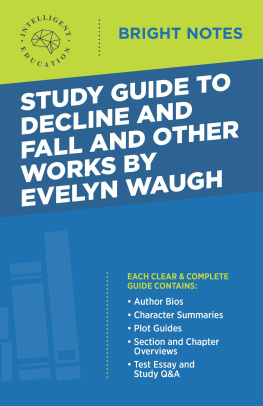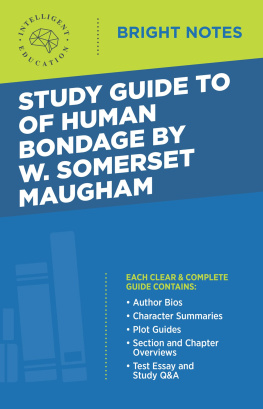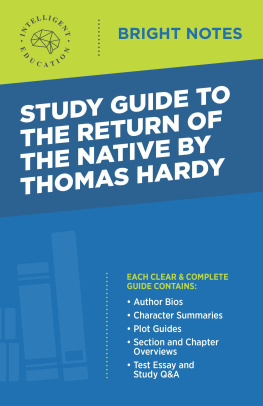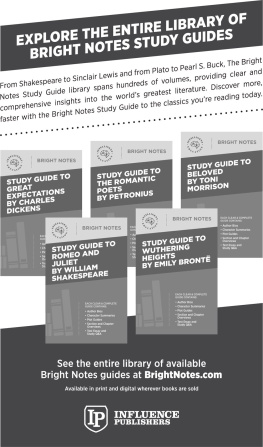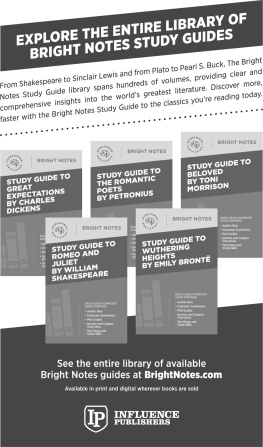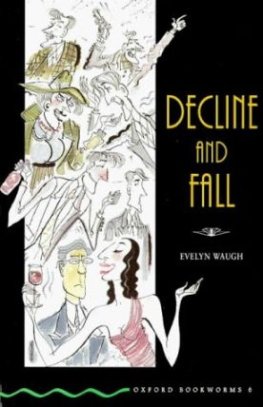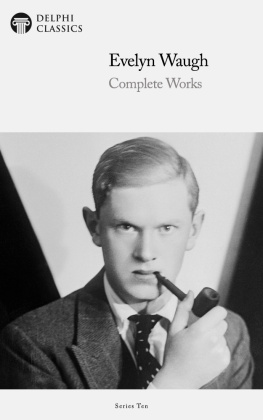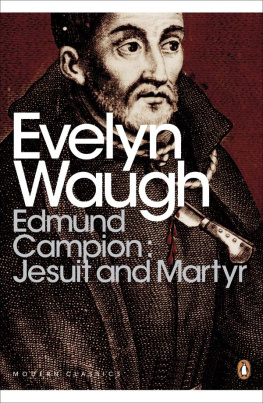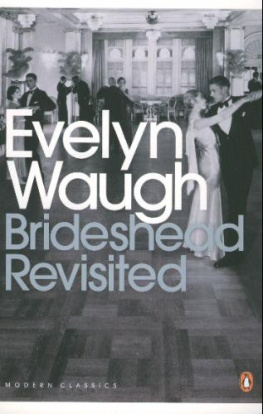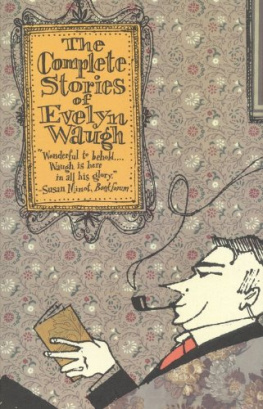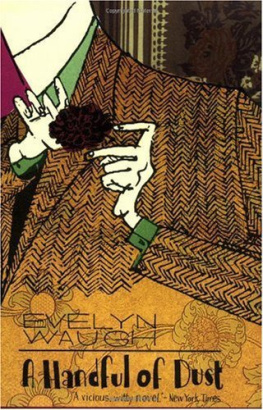

BRIGHT NOTES: Decline and Fall and Other Works
www.BrightNotes.com
No part of this publication may be used or reproduced in any manner whatsoever without written permission, except in the case of brief quotations in critical articles and reviews. For permissions, contact Influence Publishers http://www.influencepublishers.com.
ISBN: 978-1-645424-30-7 (Paperback)
ISBN: 978-1-645424-31-4 (eBook)
Published in accordance with the U.S. Copyright Office Orphan Works and Mass Digitization report of the register of copyrights, June 2015.
Originally published by Monarch Press.
Richard K. Brown, 1971
2020 Edition published by Influence Publishers.
Interior design by Lapiz Digital Services. Cover Design by Thinkpen Designs.
Printed in the United States of America.
Library of Congress Cataloging-in-Publication Data forthcoming.
Names: Intelligent Education
Title: BRIGHT NOTES: Decline and Fall and Other Works
Subject: STU004000 STUDY AIDS / Book Notes
CONTENTS

INTRODUCTION TO EVELYN WAUGH
EARLY LIFE, CONVERSION
Upper-class gentility and literary talent were characteristic of the family that welcomed the birth of Evelyn St. John Waugh in London on October 28, 1903. Both parents came from rural families in the social category of gentry - landowners, clergymen, doctors, civil servants - who associated with, but were not of, the aristocracy. Evelyns father, Arthur Waugh, was a professional man of letters - a biographer, poet, and critic - who from 1909 to 1929 was director of the venerable publishing firm of Chapman & Hall. Evelyns older brother Alec was also literary by nature, and also destined to become a famous writer.
As Evelyn Waugh declares in A Little Learning , he had a very happy childhood, assured by the love of his mother and his nurse; he came to appreciate his father only later in life. Before the young Evelyns formal schooling began, he was steeped in the classics of English poetry and prose, from which his father, an excellent amateur actor, read to him and Alec daily for many years. The effect of these early associations became evident in prep school and at Oxford, where Evelyn was prominent in the literary and debating societies.
After graduation, however, he was obliged to take a job as teacher in a school in Wales (a depressing experience reflected in his satire on Dr. Fagans school in Decline and Fall ). A publishers rejection of Waughs first effort at a novel further depressed him, and he made a half-hearted attempt at suicide, amusingly recorded at the end of A Little Learning . This period of melancholy was followed, however, by the success of Decline and Fall (1928), a novel that took London by storm. His fame was increased by his next novel, Vile Bodies (1930), which satirized the bright young things of London society in a way that suggested the moral nihilism of the day.
It was during this period that Waugh became a Roman Catholic, a consequence of the deeply religious temperament that his brother Alec had noted in him at a tender age. After an early marriage ended in divorce, Waugh traveled for ten years throughout the world. His journeys provided him with material for several travel books as well as with background for several novels. Black Mischief (1932) brilliantly satirized native African revolution and the European materialism which it parodied; Scoop (1936) held the newspaper establishment up to ridicule. Waugh also used his travel experience to provide the South American background for A Handful of Dust (1937), which was recognized almost at once as a classic. The year it was published he married again and settled down in the West Country of his ancestors, where he lived most of the rest of his life. This period also saw publication of his Edmund Campion (1935), biography of a sixteenth-century Jesuit martyr to religious persecution, which is worthy of study as a model of English prose style, even though its historical perspective may seem biased.
WARTIME SERVICE, LATER WORKS, DEATH
When World War II broke out, Evelyn Waugh volunteered for the British Royal Marines (in a spirit later attributed to the heroes of both Brideshead Revisited and Men at Arms ). On a troopship en route to the Middle East, Waugh wrote, in the style of his early satires, an entertainment called Put Out More Flags (1943) in which Basil Seal, rascal-hero of Black Mischief , reappears as a conniving war-profiteer. A lesser work, Put Out More Flags nevertheless ends on a note of patriotic affirmation as Basil volunteers for the armed forces.
After seeing action with the Commandos in the Middle East, and serving on a special mission to Yugoslavia, Waugh returned home to compose (in what he later referred to as a nostalgic mood) Brideshead Revisited . A departure from his earlier work in its lavish evocative style and romantic attitudes, it is also the first work in which his religious beliefs appear as the affirmation of a moral norm. The novel is purportedly a fictional representation of the process of conversion. It is generally and justly regarded by Waughs critics as an inferior work, but it enjoyed an enormous popular success and brought him worldwide fame.
As a result, after the war Waugh made a trip to Hollywood at the expense of a major studio; once there, he refused them permission to film Brideshead Revisited . Instead, he collected material for his next book by visiting a famous cemetery and by observing life in Los Angeles. The result of this excursion was The Loved One (1948), a brilliant satire of the more outlandish aspects of American mortuary practices. Superior to Brideshead Revisited as a literary work, it repeated the latters popular success, bringing Waugh an acclaim such as he would never again attain.
In the remaining twenty-odd years of his life, spent mainly among his growing family, he continued to produce works notable for their originality, variety, and quality, including: Helena (1950), a fictional and openly apologetic version of the life of St. Helen, mother of Constantine and founder of the True Cross; The Ordeal of Gilbert Pinfold (1957), a fascinating and at times hilarious fictional account of Waughs own nervous breakdown; and his final major work, the trilogy of World War II - Men at Arms (1952), Officers and Gentlemen (1955), and Unconditional Surrender (1961), published together as Sword of Honour (1965) - in which the hero, Guy Crouchback, embodies traditional values. In addition, Waugh wrote the authorized biography of Monsignor Ronald Knox , translator of the Bible and a lifelong friend, whose prose style Waugh modestly considered superior to his own. Finally, Waugh completed A Little Learning (1964), the first volume of his projected autobiography. He died suddenly after a brief illness in April 1966, already recognized as one of the greatest stylists in English literature.
NOVELIST AND SATIRIST
Periods of Development
Evelyn Waughs career as one of the major satirists of the twentieth century falls into two main periods, with World War II as the line of demarcation. The first period corresponds to the years between the two great wars, the Great Armistice of 1919-1939. It includes (considering only the fiction) Decline and Fall, Vile Bodies, Black Mischief , and Scoop , all of which might be characterized as satiric fantasies; and A Handful of Dust , possibly the finest example of sustained irony in the English language. This period can be justly described as one of steady development of control over his material and perfection of style. The second, postwar period of 1945-1965, begins with Brideshead Revisited , a departure from previous works in both style and purpose, and rightly described as a realistic romance. The second period, however, also includes the most brilliant of Waughs satiric fantasies, The Loved One , as well as some minor examples of the same genre; among these, Scott Kings Modern Europe and Love Among The Ruins , both socio-political in nature. Completed also in this period were a highly original historical novel of the legendary St. Helen; and the major trilogy on World War II, Sword of Honour . This last is a generally underrated work which, with at least partial success, combines his earlier satiric manner with realistic treatment of social and religious problems. Waughs second period, therefore, may be characterized as one of continuous expansion of range in the variety of literary forms and styles, a development that is nevertheless still based essentially on his satiric purpose and method.
Next page
